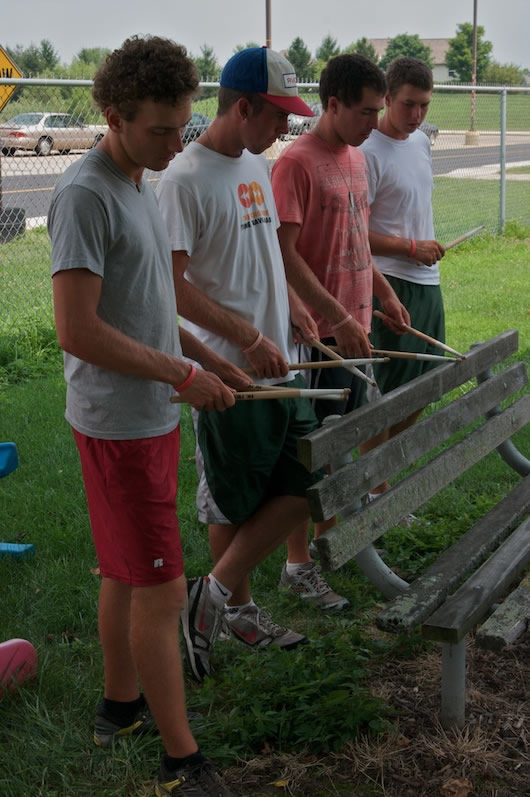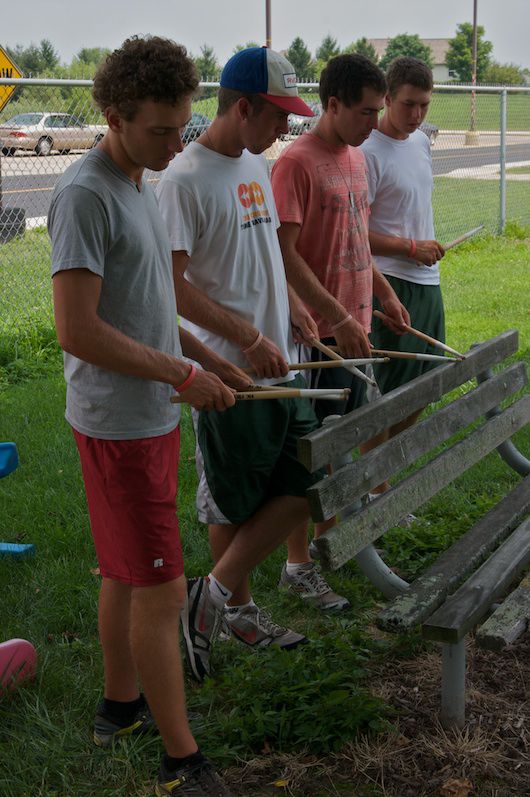Story and Photos by Ross Coyle
It’s 3 a.m. Sunday morning when the Santa Clara Vanguard busses carrying musicians, instructors, and staff pull into the parking lot of Rome Free Academy in New York. The lights come on and groggy performers stretch their arms and backs after an eight-hour bus ride. The students are eager to get off the bus and set up their beds; in five hours they’ll wake up, eat, and begin another grueling nine hours of rehearsal. Drum Major Ronnie Sunna steps into the dim front lights of the bus to pass on information on where they’ll be sleeping, eating, and showering for the night
For the last seventy days, this process has remained consistent although the bus rides can fluctuate from eight hours to only two. Personal time in California’s Santa Clara Vanguard drum corps is limited to these rides and an hour after rehearsals. Despite this, performers return year after year, often marching as many as five or six summers with the Drum & Bugle Corps. To outsiders the choice of suffering through heat, humidity, insects and exhaustion day after day is difficult to understand. Even those that have competed with a drum corps have difficulty explaining their loyalty, but can only describe it as an unforgettable experience.
Mike Hayford, a trumpet player with the Santa Clara Vanguard, reminisces on his experiences with the corps. He performed in 2007 with the Carolina Crown drum corps, but left the corps for medical reasons in the pre-season. He hadn’t planned on marching in 2008, but felt compelled to try again.
“Drum Corps would help me get back into the swing of things,” Hayford says. He recalls being unmotivated academically, as well as relationship problems and depression. The Vanguard provided motivation and pulled him out of the slump.
When he was offered a spot with the Vanguard, Hayford jumped at the chance and “Aged-Out” (graduated from professional drum corps) this summer. Professional corps carry age limits of no more than 21 years old as a requirement of membership. After their 21st year, students must turn to alumni corps. The age-out ceremony marks both an end and a beginning for musicians. They end their tutelage of sometimes eight years in corps, and prepare themselves for the real world.
“The number one reason I do this is for the friendships,” he says. “You can hang out with normal friends, but they aren’t your corps friends.” Because corps members live together for so long, they know each other as if they are family.
Many corps members develop a distinctive comradeship because of their singular drive: hard work and music. As Hayford says: “I wanted to work hard and make music people like. The alums care about it, the members care.”
Thomas Clarson, a tenor drum player, echoes Hayford’s sentiment. “We’re in this together, we have the bad times and the good times together,” he says. Clarson, a native of Östland, Belgium, worked full time to raise $6,000 to make the thirteen-hour flight once a month to participate in Drum Corps’s winter weekend camps and moved in with the Corps in late May.
“What make this great is that we drum together, it’s not one person but four,” he says. “When everything is locked in, it’s a really unique feeling, a connection through the music.”
Many Drum Corps veterans cite such a connection when discussing their corps careers. Joey Rios, a Fresno resident, marched with the Valley Fever corps in 1983, and his son now marches with the Blue Devils corps.
“The level marching puts you at is such a great thing,” he says, “but my motivation to go back was the people I was marching with.”
Rios also believes that there is a transformational aspect to corps, and claims his son as an example. Rios’s son, who was diagnosed with attention-deficit hyperactivity disorder (ADD), was a troubled student.
“Up to his sixth grade year,” Rios says, “we were in and out of the principal’s office.” Drum Corps gave his son a chance to focus on something he loved.
“When I took my son to drum corps, his life changed,” Rios says. “Drum Corps has helped him immensely.”
Rios, who taught high school drum lines in Madera and Bakersfield, California, says his son is not alone. Rios believes drum corps is transformative because of the difficulty of the activity and the dedication it requires.
“You can’t be lazy,” he says. “You have to be willing to go to that next level until that one week [finals week] in August.” Andre Feagin, the brass caption head of the Santa Clara Vanguard, shares his sentiment.
Feagin, the band director of the University of Texas at El Paso, understands the drive to excel and members devotion to the activity. He claims that beyond the performances and enjoyment of the activity, drum corps makes people better.
“I think there’s a lot they learn about perseverance, about loyalty, about respect,” Feagin says. Students leave drum corps with a sense of responsibility and character, he says.
“It’s the reason why 15 years after my initiation into this activity, I am still in this activity. I know what it does for the individual because I know what it did for me.”
See what other stories Ross discovered this summer in drum corps.









